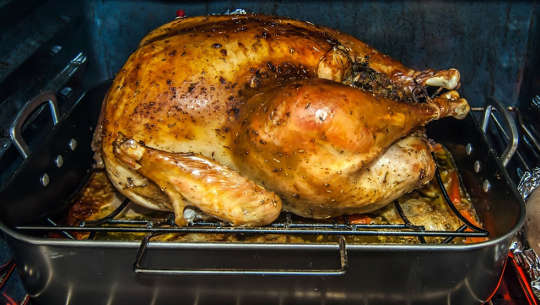
Image by PublicDomainPictures
The holidays are just around the corner and this year might feel at least a little more normal than our first pandemic holiday season. People are more likely to gather with friends and family, and to celebrate with a roasted turkey, chicken, or goose. But some kitchen traditions are best avoided if we want to avoid foodborne illness. One of those is the idea that you need to wash or rinse your poultry before cooking it.
The Centers for Disease Control and Prevention (CDC) estimates that one million people in the US each year get sick from raw or undercooked poultry. Eating undercooked poultry—or eating other foods that have been contaminated by raw poultry and its juices—can cause foodborne illness. And with an estimated 45 million turkeys being prepped, cooked, and served for Thanksgiving alone, it is important to keep in mind best poultry preparation practices to keep everyone at the table happy and healthy.
To start, do not wash the turkey. Washing can splash potentially contaminated droplets and juices onto the countertop and nearby utensils and ready-to-eat foods. An even greater concern is that washing the bird will contaminate the sink and, if not cleaned and sanitized properly, pose a significant cross-contamination risk.
That’s because other food preparation, such as vegetable scrubbing or rinsing lettuce, happens at the sink—and contaminated drops in the sink can splash or bounce onto other foods or utensils in the sink basin.
Recent research shows that people do not properly clean and sanitize the sink after washing poultry. Most people just rinse the sink with water, making the sink a source of cross-contamination of food and other items.
In fact, the sink is a potential source of contamination even without any turkey washing. That means it is important to clean and sanitize even if you don’t wash your bird—but especially so if there is a chance that raw turkey parts or juices might have touched the sink. Sinks should be cleaned with soapy water and then a sanitizer, such as a commercial all-purpose or multi-purpose cleaner with bleach.
Hands, another potential source of cross-contamination, should be washed right after handling the raw turkey or contact with its juices. Proper handwashing (wetting hands, using soap, and scrubbing for 20 seconds) plays a key role in reducing the spread of disease-causing germs from COVID-19, influenza, or foodborne pathogens such as Salmonella, which can be found in turkey.
Finally, once that turkey is in the oven, use a food thermometer to check that it is cooked to 165 degrees F to kill any disease-causing bacteria that might be in the turkey. Cooking to a safe internal temperature is the best (and only) way to kill bacteria that could cause disease—washing or brining the turkey will not destroy bacteria.
Keeping these best practices in mind will help ensure that everyone enjoys a safe holiday meal with family and friends this year and for more normal years to come.
About The Author
Lisa Shelley, a food safety researcher from North Carolina State University, has tips on how you can keep yourself and your dinner guests safe from foodborne illnesses.
Related Books:
The Body Keeps the Score: Brain Mind and Body in the Healing of Trauma
by Bessel van der Kolk
This book explores the connections between trauma and physical and mental health, offering insights and strategies for healing and recovery.
Click for more info or to order
Breath: The New Science of a Lost Art
by James Nestor
This book explores the science and practice of breathing, offering insights and techniques for improving physical and mental health.
Click for more info or to order
The Plant Paradox: The Hidden Dangers in "Healthy" Foods That Cause Disease and Weight Gain
by Steven R. Gundry
This book explores the links between diet, health, and disease, offering insights and strategies for improving overall health and wellness.
Click for more info or to order
The Immunity Code: The New Paradigm for Real Health and Radical Anti-Aging
by Joel Greene
This book offers a new perspective on health and immunity, drawing on principles of epigenetics and offering insights and strategies for optimizing health and aging.
Click for more info or to order
The Complete Guide to Fasting: Heal Your Body Through Intermittent, Alternate-Day, and Extended Fasting
by Dr. Jason Fung and Jimmy Moore
This book explores the science and practice of fasting offering insights and strategies for improving overall health and wellness.
Click for more info or to order
























